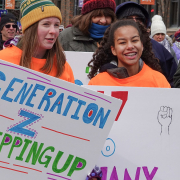Is Gen Z Turning Against Western Civilization?
The younger generations seem increasingly crazed. A worrying proportion of the young sympathises with those who launch terror attacks against Israel, supports the immediate elimination of fossil fuels or demands the wiping out of gender distinctions. All these positions are troubling in themselves, but they also reflect a deeper malady – a mostly apolitical breakdown of social norms, personal interaction, literacy and logical thinking.
No single issue has catalysed Gen Z, as the Vietnam War did for the Baby Boomer generation. Boomers were angry but did not generally despair about their futures, which turned out reasonably well, buoyed by the creation of new jobs, rising property and stock prices. In contrast, most younger people dread almost everything that lies ahead. The majority of them, according to a Lancet study, see the entire planet as doomed by climate change.
This negative take on the future shows that the young are being poorly served in numerous ways, notably by the economy. Only 36 per cent of voters in a new Wall Street Journal / NORC survey say the American Dream still holds true, a feeling that is even more pronounced among younger people. Currently, less than half of millennials are doing better financially than their parents were at the same stage in life. This is the first time a generation has fallen behind its elders in recent history. About seven in 10 Americans think that young adults today have a harder time than their parents’ generation when it comes to saving for the future (72 per cent), paying for college (71 per cent) and buying a home (70 per cent), according to a 2021 report by the Pew Research Centre.
The decline in homeownership – which nearly three in five young people see as an essential part of the American Dream – is especially damaging. Homeownership roots people in their community, forces them to mature and is closely tied to the desire to start a family. According to US Census Bureau data, the rate of homeownership among young adults at ages 25 to 34 was 45 per cent for Generation X. This has dropped to 37 per cent for millennials, the generation that should now be starting to have families. In the UK, house prices hit a record high last year, while the rate of homeownership among people under 35 halved between 1997 and 2017.
The trends are similarly worrying in the world of work. Despite labour shortages that are likely to get worse, real wages have not surpassed costs for most people living in the US, the EU, Japan and the UK. In the US, men’s labour participation is now lower than in 1940, when unemployment was three times higher. Labour-participation rates for young men have suffered a particularly steep drop from over 80 per cent in the 1980s to barely 60 per cent now.
These conditions demonstrate the erosion of ambition throughout the West and even in East Asia. Fewer millennials and Gen Zers seem to take work seriously. There is increasing evidence, according to recent Conference Board studies, that ‘work-life balance’ is more central to Gen Z than career advancement. Some even celebrate worklessness as ‘funemployment’. The overwhelming majority of American part-time workers have chosen to work part-time and are not seeking more hours.
Europe has the most ‘disengaged’ workforce in the high-income world. In the UK, employers fret about a diminishing millennial work ethic. Nearly 10 per cent of young Brits who are currently studying or out of work say they have no intention of ever starting work, while roughly a third doubt they will reach their career goals. This has gone hand in hand with young people delaying their transition to adulthood and having fewer children.
Similar phenomena can be seen in Japan. Even in China, a large portion of the young, including the well-educated, have taken to ‘lying flat’. They seek a way of living without commitment to a job, developing skills or achieving what were once considered the rites of adulthood – from owning a home to getting married or starting a family. Unsurprisingly, the birth rates in Europe, America and East Asia have dropped to record low levels.
Read the rest of this piece at Spiked.
Joel Kotkin is the author of The Coming of Neo-Feudalism: A Warning to the Global Middle Class. He is the Roger Hobbs Presidential Fellow in Urban Futures at Chapman University and Executive Director for Urban Reform Institute. Learn more at joelkotkin.com and follow him on Twitter @joelkotkin.
Photo: Susan Ruggles Flickr, under CC 2.0 License.



